|
|
|
Sort Order |
|
|
|
Items / Page
|
|
|
|
|
|
|
| Srl | Item |
| 1 |
ID:
118927
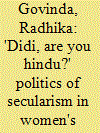

|
|
|
|
|
| Publication |
2013.
|
| Summary/Abstract |
In this paper I take the women's movement as the site for unpacking some of the strains and tensions involved in practical interpretations of secularism in present-day India. Several sources within and outside the movement point out that there has been a tendency to take the existence of secularism for granted, and that the supposedly secular idioms and symbols used for mobilizing women have been drawn from Hindu religio-cultural sources. Women from Dalit and religious minority communities have felt alienated by this. Hindu nationalists have cleverly appropriated these idioms and symbols to mobilize women as foot soldiers to further religious nationalism. Through a case-study of a grassroots women's NGO working in Uttar Pradesh, I seek to explore how women's organizations may be reshaping their agendas and activism to address this issue. Specifically, I will examine how and why the 2002 Gujarat riots affected the NGO, the ways in which it has started working on the issue of communal harmony and engaging with Muslims since the riots, and the challenges with which it has been confronted as a result of its efforts. In doing so, I will show how the complexities of NGO-based women's activism have become intertwined with the politics of secularism.
|
|
|
|
|
|
|
|
|
|
|
|
|
|
|
|
| 2 |
ID:
118920
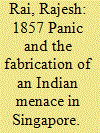

|
|
|
|
|
| Publication |
2013.
|
| Summary/Abstract |
This paper examines how local and transnational developments converged in 1857 to transform European attitudes towards Indian inhabitants in Singapore. Recognized in preceding years as useful to the security and the development of the colony, by late 1857, Indians in Singapore had come to be viewed by Europeans as a 'menace'. That change in disposition was largely the product of factors extraneous to the actions of the local Indian inhabitants themselves. Besieged by news of multiple challenges to the British Empire, European nerves were rattled by perceived threats emanating from sections of the Asian populace in Singapore. In early 1857, a dispute between Tamil-Muslims and Europeans brought to the fore the latter's anxieties and prejudices. That episode was followed, in May, by news of the massive rebellion of native troops in India. The emerging distrust for Indians was exacerbated by public rumours and fanned by editorials and reports published in the local press. Perceptions of immediate danger from the colony of transported convicts, and the fear of an Indian conspiracy during Muharram, sparked a panic that would have ramifications on the position of Indians in Singapore and leave an imprint on the long term political development of the Straits Settlements
|
|
|
|
|
|
|
|
|
|
|
|
|
|
|
|
| 3 |
ID:
167250
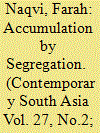

|
|
|
|
|
| Summary/Abstract |
This article is part of a Book Forum review of Ghazala Jamil’s book Accumulation by Segregation (2017). The Book Forum consists of individual commentaries on this text by four interested scholars, followed by a response by the author. The article may be read individually or alongside the other contributions to the Forum, which together constitute a comprehensive discussion of the themes and arguments in the book.
|
|
|
|
|
|
|
|
|
|
|
|
|
|
|
|
| 4 |
ID:
167254
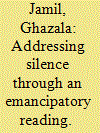

|
|
|
|
|
| Summary/Abstract |
This article is part of a Book Forum review of Ghazala Jamil’s book Accumulation by Segregation (2017). The Book Forum consists of individual commentaries on this text by four interested scholars, followed by a response by the author. The article may be read individually or alongside the other contributions to the Forum, which together constitute a comprehensive discussion of the themes and arguments in the book.
|
|
|
|
|
|
|
|
|
|
|
|
|
|
|
|
| 5 |
ID:
108370
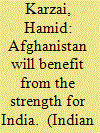

|
|
|
| 6 |
ID:
187444
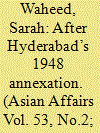

|
|
|
|
|
| Summary/Abstract |
This paper revisits the violent annexation of the erstwhile princely state of Hyderabad by the Indian army in 1948 as an inaugural moment of dispossession to reconstruct Hyderabad's twentieth century past along the axes of Muslim belonging and memory. I argue that we must situate twentieth and twenty-first century Hyderabadi Muslim migration in relation to Partition-related displacements and attempts to overcome them through economic conditions provided by migration. The partition of India prompted waves of migration—such as the later migration of Hyderabadi Muslims to the Persian Gulf in the wake of 1970s oil boom—and their sense of displacement persisted long past the mid-twentieth century, reshaping Muslim notions of belonging. The use of the nation-state as the dominant framework to analyze these shifts is insufficient for understanding Hyderabadi Muslims' sense of belonging and citizenship, which must be also contextualized in terms of upward class mobility along the axes of global and local contexts.
|
|
|
|
|
|
|
|
|
|
|
|
|
|
|
|
| 7 |
ID:
114859
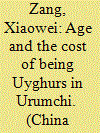

|
|
|
|
|
| Publication |
2012.
|
| Summary/Abstract |
This article asks: is the cost of being Uyghurs higher for young Uyghurs than for old Uyghurs in Ürümchi? I address this question with data from a survey of 2,947 people conducted in Ürümchi in 2005. The cost of being Uyghurs refers to the extent of economic inequality in the earnings of Han Chinese and Uyghurs. I develop three hypotheses on the effect of age on earnings differentials between Han Chinese and Uyghurs. Data analyses show that although young Uyghurs are better educated and earn more than old Uyghurs, they are more likely than old Uyghurs to suffer from being Uyghurs in Ürümchi. This finding has policy implications for the reduction of ethnic disparity in Xinjiang.
|
|
|
|
|
|
|
|
|
|
|
|
|
|
|
|
| 8 |
ID:
188023


|
|
|
|
|
| Summary/Abstract |
The dominant academic narrative portrays British Muslim communities as alienated by counter-terrorism policies and consequently reluctant to cooperate with authorities by taking action against Islamist extremism. This article reassesses and nuances the “alienation narrative” with the use of unique data from three robust surveys of British Muslims. It finds that although a minority shows signs of alienation, most British Muslims are satisfied with and trust counter-terrorism policies as well as the government and the police. The level of willingness to take action against Islamist extremism is also high. The study confirms that aspects of alienation correlate with reduced willingness to take action against Islamist extremism, although they do not necessarily lead to disengagement.
|
|
|
|
|
|
|
|
|
|
|
|
|
|
|
|
| 9 |
ID:
167511
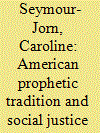

|
|
|
|
|
| Summary/Abstract |
This article responds to recent research calling for more nuanced discussions of Muslim political and social activist subjectivities (Ahmed 2011; Maira 2016; Mansouri et al. 2016; Nagel and Staeheli 2011). We analyze community and social justice activism among Muslims in Milwaukee through the lens of the American prophetic tradition. We argue that Muslim leaders in Milwaukee represent their activism as part of this tradition, and that they draw upon a complex of religious, social and political discourses and social practices. These include American civil rights activism, Islamically inspired social action, and a desire to engage in placemaking that responds to the specific conditions of Milwaukee, a city that features intense racial segregation, dense pockets of poverty, and increased immigration from the Arabo-Islamic world. Thus, we see a pluralization of Muslim social activist subjectivity: social justice activism which is religiously based, related to the civil rights tradition, and which is also highly attuned to the specific ways in which Muslims may practice a politics of belonging in this Midwestern city.
|
|
|
|
|
|
|
|
|
|
|
|
|
|
|
|
| 10 |
ID:
102594
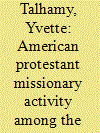

|
|
|
|
|
| Publication |
2011.
|
| Summary/Abstract |
During the 17th century Christian missionaries began to arrive to the region of the Ottoman Empire especially to Syria, Lebanon, and the Holy Land, in order to work among the Eastern Christians and among the Muslims, including the religious minorities such as the Druze and the Nusayris/?Alawis. Their main target was to convince them to convert. The American Protestant missionaries were the main missionaries who worked among the Nusayris. Due to their extreme beliefs, the Nusayris were mistreated by the Ottomans, and the region in which they resided was much neglected. The Protestant missionaries took advantage of this opportunity and began to build schools in the region so that Nusayri children could be taught the Bible and be induced to convert. The Ottomans grasped the danger of the missionary activity in the Empire and tried to win the Nusayris back by building schools and mosques to 'Sunnify' them. After 60 years of working amongst the Nusayris the success of the missionaries was very limited.
|
|
|
|
|
|
|
|
|
|
|
|
|
|
|
|
| 11 |
ID:
082558
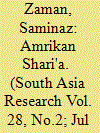

|
|
|
|
|
| Publication |
2008.
|
| Summary/Abstract |
This article examines the growth and development of the hybridized practice of Muslim laws in the shadow of the American legal system, a form of unofficial law that may be called amrikan shari'a. Following the immigration trajectory of many American Muslims, transnational information links forged by wide-scale immigration are explored, particularly the innovative use of new online resources available to Muslim immigrants in America and the proliferation of online fiqh discussion groups, which has fostered the very American character of the do-it-yourself mufti. A further section considers several mahr cases that have reached American courtrooms and compares one such case with a similar English case, which was decided rather differently. The article concludes with an assessment of how the Bush government's 'War on Terror' and domestic US developments, such as legalizing gay marriage in Massachusetts and the increasing presence of second-generation Muslim Americans, combine to affect the future of amrikan shari'a within a secular legal system
|
|
|
|
|
|
|
|
|
|
|
|
|
|
|
|
| 12 |
ID:
173271
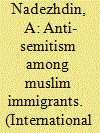

|
|
|
|
|
| Summary/Abstract |
EXPERTS have for years been pointing to mounting xenophobic, anti-immigrant, and radical sentiments among the population of Europe. However, recently it is not only refugees and economic migrants from the Middle East and North Africa (MENA region) who have been facing hostility but also Jews who have lived in Europe permanently and have been integrated into European society. Usually, European anti-Semitism has been blamed on right-wing extremists and radicals, especially those in Hungary and Poland.1 There occur random instances of trivial anti-Semitic behavior, for example at school or in companies, that are not investigated or taken into account in police statistics.
|
|
|
|
|
|
|
|
|
|
|
|
|
|
|
|
| 13 |
ID:
089370
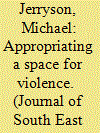

|
|
|
|
|
| Publication |
2009.
|
| Summary/Abstract |
In southern Thailand, monasteries once served as focal points for different communal identities to negotiate shared space and, with it, shared identities. However, since martial law was declared in 2004, Muslims in southern Thailand do not frequent monasteries. Instead, soldiers and police occupy monastery buildings and protect the perimeters from attacks. In addition, there are now military monks, soldiers who are simultaneously ordained monks, who work to protect the monasteries. This article argues that the Thai State's militarisation of monasteries and the role of Buddhist monks fuel a religious dimension to the ongoing civil war in southern Thailand.
|
|
|
|
|
|
|
|
|
|
|
|
|
|
|
|
| 14 |
ID:
096067
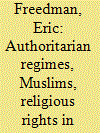

|
|
|
| 15 |
ID:
095996
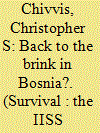

|
|
|
|
|
| Publication |
2010.
|
| Summary/Abstract |
Today in Sarajevo there is disturbing talk of an unravelling of the Dayton Accords that ended the bloody civil war there 14 years ago. Nearly 100,000 people were killed in that war, which pitted Muslims against Serbs against Croats, and saw Europe's nastiest massacres since the Second World War. Since 1995, Bosnia has been at peace, but the main political parties continue to fight over the basic issues that started the war almost two decades ago. Concern over the general political situation has increased as nationalist rhetoric has raised the spectre of a re-division of the country and an ensuing descent into violence. Some in Sarajevo even evoke the possibility of 'European Gazas' emerging in some parts of the county, where there are hints that unemployed Muslim youth may be coming under the influence of a radical, foreign brand of Wahhabist Islam.
|
|
|
|
|
|
|
|
|
|
|
|
|
|
|
|
| 16 |
ID:
118472
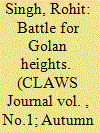

|
|
|
| 17 |
ID:
110152
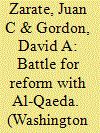

|
|
|
| 18 |
ID:
059382
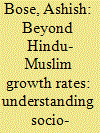

|
|
|
| 19 |
ID:
108996
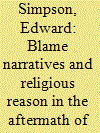

|
|
|
|
|
| Publication |
2011.
|
| Summary/Abstract |
Recent writing on religion in Gujarat has often confused political rhetoric with common religious belief and practice. Thus, religious categories have become caricatures standing for sociological realities and totalised worldviews. In this scheme, 'Hindus' and 'Muslims' are supposed to believe different things which ensure that they see and act in the world quite differently. In this paper, I examine the narratives of blame that emerged after the 2001 earthquake in Gujarat. The ethnography suggests that although religious identity plays a role in the way blame is cast, people of different religious communities also use common frames of logic and their shared experiences of shock and alienation to explain catastrophe. The religious reasoning of blame narratives is therefore shown to have a broader cultural existence outside the boundaries of particular religious identities.
|
|
|
|
|
|
|
|
|
|
|
|
|
|
|
|
| 20 |
ID:
151953
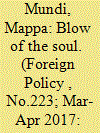

|
|
|
|
|
|
|
|